专四练习之语法2(非谓语动词,独立结构、悬垂结构)解读
专四语法2:非谓语动词

be+动词不定式
1. 表示最近,未来的计划或安排(相当于be going to) You are to see him today at six o’clock. 2. 表示该做或不该做的事(相当于 should/must/ought to/have to等)。 You are to explain this. 3. 表示能不能发生的事(相当于can/may等) Similar conditions are to be found in all other Latin American countries.
3. 在should/would like或should/would have liked后用不定式完成式表示没有实现的愿 望。 I should like to have gone with her. (但没有 去) I should have liked to have seen her face when she read the letter. (我真想见到她读 信时的表情。)
2. so as (not) to, only to, in order to, so (such)… as to…(如此…以便…)表目的 We have got so plenty of food as to treat our guests. He kept quiet about the accident so as not to lose his job. I come here only to say goodbye to you.
专四语法(非谓语动词)解读

• (2) 不定式和动名词都可以用it来代替作形式主 语,但在含有no,-less等否定词的句子里, 常用动名词作主语。如: • It is useless talking with her. • It is no good discussing with her.
• (3) 如果主语和表语都是非谓语动词,两者应 保持同样的形式,或同为不定式,或同为动 名词。如: • To see is to believe. 眼见为实。 • Seeing is believing. 眼见为实。
(4) 不定式的逻辑主语一般由介词for引导,但下列表 示人的性格行为特征的形容词做表语时, 不定式的 逻辑主语则由of引导: absurd, bold, brave, courageous, careful, careless, clever, wise, foolish, silly, stupid, good, nice, kind, thoughtful, considerate, greedy, generous, honest, modest, polite, rude, cruel, selfish, lazy, wicked, wrong。如: Experts say walking is one of the best ways for a person to stay healthy. It’s clever of you to have invented such a device.
英语独立主格结构与悬垂分词
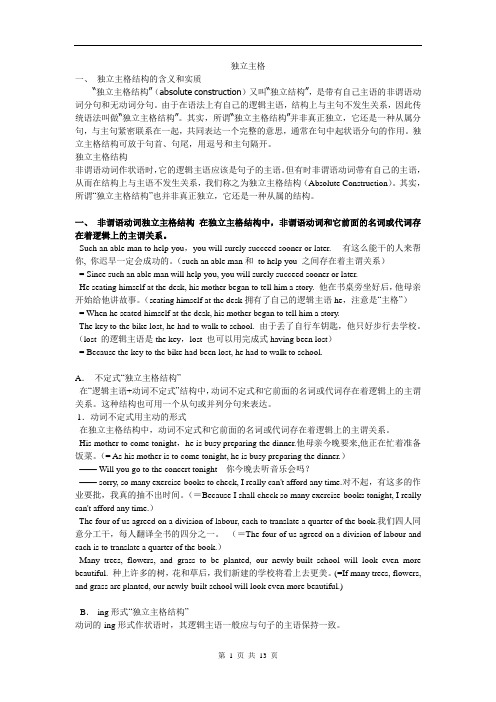
独立主格
一、独立主格结构的含义和实质
“独立主格结构”(absolute construction)又叫“独立结构”,是带有自己主语的非谓语动词分句和无动词分句。由于在语法上有自己的逻辑主语,结构上与主句不发生关系,因此传统语法叫做“独立主格结构”。其实,所谓“独立主格结构”并非真正独立,它还是一种从属分句,与主句紧密联系在一起,共同表达一个完整的意思,通常在句中起状语分句的作用。独立主格结构可放于句首、句尾,用逗号和主句隔开。
独立主格结构
非谓语动词作状语时,它的逻辑主语应该是句子的主语。但有时非谓语动词带有自己的主语,从而在结构上与主语不发生关系,我们称之为独立主格结构(Absolute Construction)。其实,所谓“独立主格结构”也并非真正独立,它还是一种从属的结构。
一、非谓语动词独立主格结构在独立主格结构中,非谓语动词和它前面的名词或代词存在着逻辑上的主谓关系。
Such an able man to help you,you will surely succeed sooner or later. 有这么能干的人来帮你, 你迟早一定会成功的。(such an able man和to help you 之间存在着主谓关系)
= Since such an able man will help you, you will surely succeed sooner or later.
He seating himself at the desk, his mother began to tell him a story. 他在书桌旁坐好后,他母亲开始给他讲故事。(seating himself at the desk拥有了自己的逻辑主语he,注意是“主格”)
英语专四语法重点解析
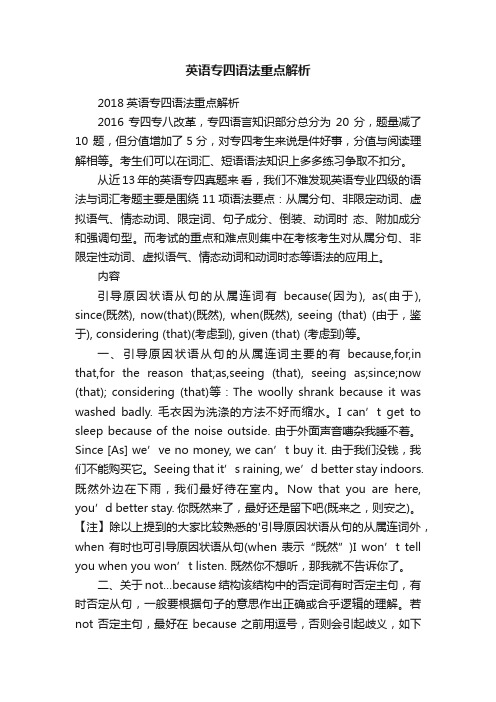
英语专四语法重点解析
2018英语专四语法重点解析
2016专四专八改革,专四语言知识部分总分为20分,题量减了10 题,但分值增加了5分,对专四考生来说是件好事,分值与阅读理解相等。考生们可以在词汇、短语语法知识上多多练习争取不扣分。
从近13年的英语专四真题来看,我们不难发现英语专业四级的语法与词汇考题主要是围绕11项语法要点:从属分句、非限定动词、虚拟语气、情态动词、限定词、句子成分、倒装、动词时态、附加成分和强调句型。而考试的重点和难点则集中在考核考生对从属分句、非限定性动词、虚拟语气、情态动词和动词时态等语法的应用上。
内容
引导原因状语从句的从属连词有because(因为), as(由于), since(既然), now(that)(既然), when(既然), seeing (that) (由于,鉴于), considering (that)(考虑到), given (that) (考虑到)等。
一、引导原因状语从句的从属连词主要的有because,for,in that,for the reason that;as,seeing (that), seeing as;since;now (that); considering (that)等:The woolly shrank because it was washed badly. 毛衣因为洗涤的方法不好而缩水。I can’t get to sleep because of the noise outside. 由于外面声音嘈杂我睡不着。Since [As] we’ve no money, we can’t buy it. 由于我们没钱,我们不能购买它。Seeing that it’s raining, we’d better stay indoors. 既然外边在下雨,我们最好待在室内。Now that you are here, you’d better stay. 你既然来了,最好还是留下吧(既来之,则安之)。【注】除以上提到的大家比较熟悉的'引导原因状语从句的从属连词外,when有时也可引导原因状语从句(when表示“既然”)I won’t tell you when you won’t listen. 既然你不想听,那我就不告诉你了。
专业英语四级-2
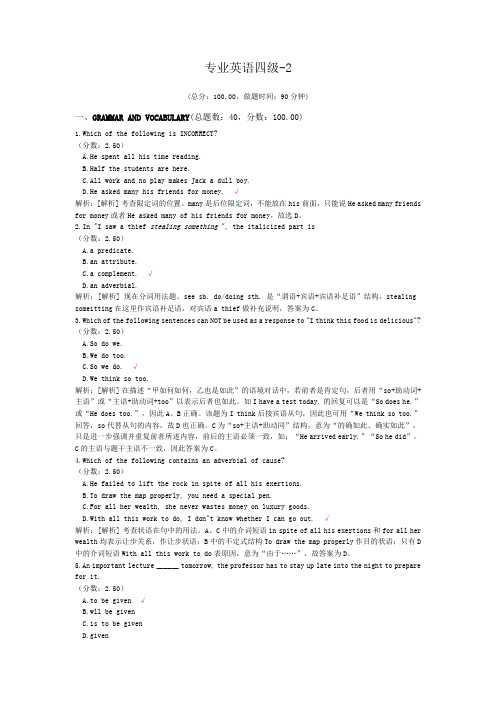
专业英语四级-2
(总分:100.00,做题时间:90分钟)
一、GRAMMAR AND VOCABULARY(总题数:40,分数:100.00)
1.Which of the following is INCORRECT?
(分数:2.50)
A.He spent all his time reading.
B.Half the students are here.
C.All work and no play makes Jack a dull boy.
D.He asked many his friends for money. √
解析:[解析] 考查限定词的位置。many是后位限定词,不能放在his前面,只能说He asked many friends for money或者He asked many of his friends for money,故选D。
2.In "I saw a thief stealing something ", the italicized part is
(分数:2.50)
A.a predicate.
B.an attribute.
C.a complement. √
D.an adverbial.
解析:[解析] 现在分词用法题。see sb. do/doing sth. 是“谓语+宾语+宾语补足语”结构,stealing someitting在这里作宾语补足语,对宾语a thief做补充说明,答案为C。
3.Which of the following sentences can NOT be used as a response to "I think this food is delicious"? (分数:2.50)
关于独立主格结构和悬垂结构
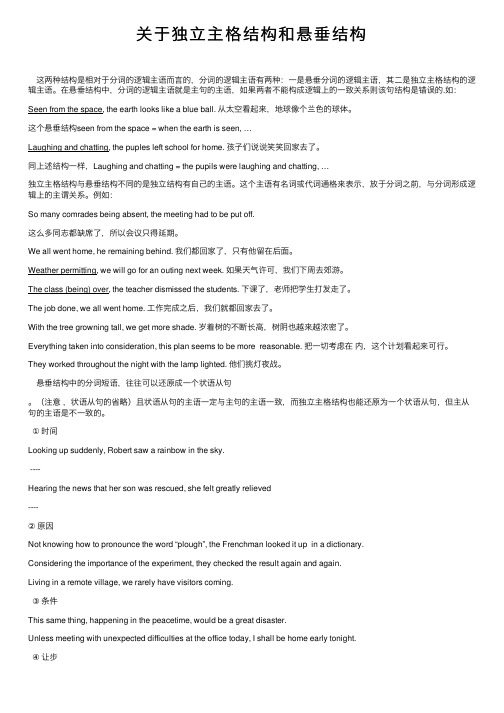
关于独⽴主格结构和悬垂结构
这两种结构是相对于分词的逻辑主语⽽⾔的,分词的逻辑主语有两种:⼀是悬垂分词的逻辑主语,其⼆是独⽴主格结构的逻辑主语。在悬垂结构中,分词的逻辑主语就是主句的主语,如果两者不能构成逻辑上的⼀致关系则该句结构是错误的.如:
Seen from the space, the earth looks like a blue ball. 从太空看起来,地球像个兰⾊的球体。
这个悬垂结构seen from the space = when the earth is seen, …
Laughing and chatting, the puples left school for home. 孩⼦们说说笑笑回家去了。
同上述结构⼀样,Laughing and chatting = the pupils were laughing and chatting, …
独⽴主格结构与悬垂结构不同的是独⽴结构有⾃⼰的主语。这个主语有名词或代词通格来表⽰,放于分词之前,与分词形成逻辑上的主谓关系。例如:
So many comrades being absent, the meeting had to be put off.
这么多同志都缺席了,所以会议只得延期。
We all went home, he remaining behind. 我们都回家了,只有他留在后⾯。
Weather permitting, we will go for an outing next week. 如果天⽓许可,我们下周去郊游。
英语语法非谓语动词
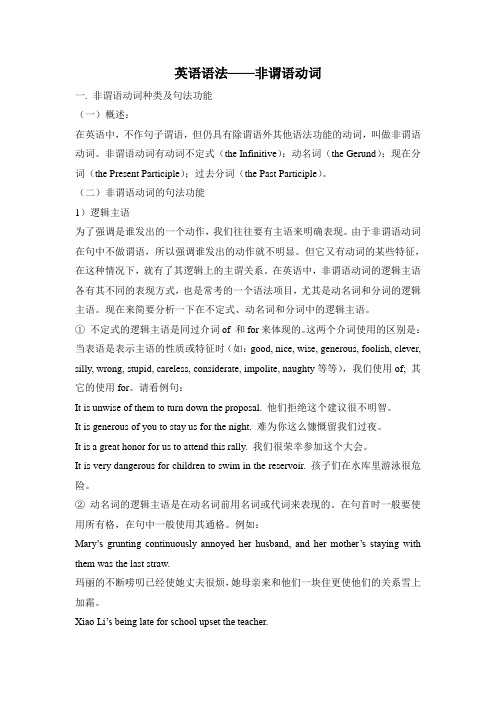
英语语法——非谓语动词
一. 非谓语动词种类及句法功能
(一)概述:
在英语中,不作句子谓语,但仍具有除谓语外其他语法功能的动词,叫做非谓语动词。非谓语动词有动词不定式(the Infinitive);动名词(the Gerund);现在分词(the Present Participle);过去分词(the Past Participle)。
(二)非谓语动词的句法功能
1)逻辑主语
为了强调是谁发出的一个动作,我们往往要有主语来明确表现。由于非谓语动词在句中不做谓语,所以强调谁发出的动作就不明显。但它又有动词的某些特征,在这种情况下,就有了其逻辑上的主谓关系。在英语中,非谓语动词的逻辑主语各有其不同的表现方式,也是常考的一个语法项目,尤其是动名词和分词的逻辑主语。现在来简要分析一下在不定式、动名词和分词中的逻辑主语。
①不定式的逻辑主语是同过介词of 和for来体现的。这两个介词使用的区别是:当表语是表示主语的性质或特征时(如:good, nice, wise, generous, foolish, clever, silly, wrong, stupid, careless, considerate, impolite, naughty等等),我们使用of; 其它的使用for。请看例句:
It is unwise of them to turn down the proposal. 他们拒绝这个建议很不明智。
It is generous of you to stay us for the night. 难为你这么慷慨留我们过夜。
悬垂结构独力主格结构
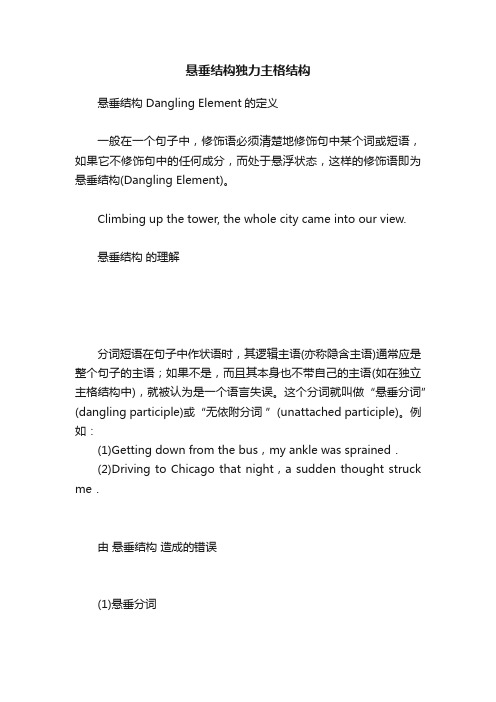
悬垂结构独力主格结构
悬垂结构 Dangling Element的定义
一般在一个句子中,修饰语必须清楚地修饰句中某个词或短语,如果它不修饰句中的任何成分,而处于悬浮状态,这样的修饰语即为悬垂结构(Dangling Element)。
Climbing up the tower, the whole city came into our view.
悬垂结构的理解
分词短语在句子中作状语时,其逻辑主语(亦称隐含主语)通常应是整个句子的主语;如果不是,而且其本身也不带自己的主语(如在独立主格结构中),就被认为是一个语言失误。这个分词就叫做“悬垂分词”(dangling participle)或“无依附分词”(unattached participle)。例如:
(1)Getting down from the bus,my ankle was sprained.
(2)Driving to Chicago that night,a sudden thought struck me.
由悬垂结构造成的错误
(1)悬垂分词
误: Being Sunday, they went for a picnic.
正: It being Sunday, they went for a picnic.
正: As it was Sunday, they went for a picnic.
(2)悬垂不定式
误:To swim properly, a course of instruction was necessary.
正:To swim properly, one needs a course of instruction.
专四练习之语法(非谓语动词,独立结构)

有关独立主格的2道专四试题
There ____nothing more for discussion, the meeting came to an end half an hour earlier.
A. not to accept B. not having accepted C. having not accepted D. not accepting D.我从不后悔没有接受那个提议,因为那并非
我的兴趣所以。B的表达包括了时间概念,而 该题并没有强调事件发生的先后顺序,没有时 态要求。
(三)其作用相当于状语,多用来表示行为、方式或伴 随的情况,有时也用来表示时间和条件。这种结构多 用在书面语中。
1.名词(或代词)+现在分词(或过去分词)。如: 1)The moon appearing, they decided to go on with their journey. 2)Good-bye said,he went home.
A. that he is thinking B. to be thinking C. that he is to think D. to think
B. 人们认为财政部长正在考虑通过征收 新税种来增加政府的额外收入。
垂悬结构和独立主格结构
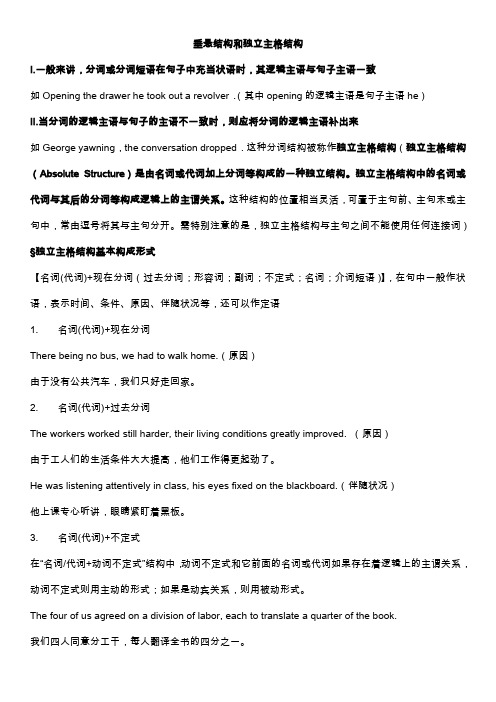
垂悬结构和独立主格结构
I.一般来讲,分词或分词短语在句子中充当状语时,其逻辑主语与句子主语一致
如Opening the drawer he took out a revolver.(其中opening的逻辑主语是句子主语he)
II.当分词的逻辑主语与句子的主语不一致时,则应将分词的逻辑主语补出来
如George yawning,the conversation dropped.这种分词结构被称作独立主格结构(独立主格结构(Absolute Structure)是由名词或代词加上分词等构成的一种独立结构。独立主格结构中的名词或代词与其后的分词等构成逻辑上的主谓关系。这种结构的位置相当灵活,可置于主句前、主句末或主句中,常由逗号将其与主句分开。需特别注意的是,独立主格结构与主句之间不能使用任何连接词)§独立主格结构基本构成形式
【名词(代词)+现在分词(过去分词;形容词;副词;不定式;名词;介词短语)】,在句中一般作状语,表示时间、条件、原因、伴随状况等,还可以作定语
1. 名词(代词)+现在分词
There being no bus, we had to walk home.(原因)
由于没有公共汽车,我们只好走回家。
2. 名词(代词)+过去分词
The workers worked still harder, their living conditions greatly improved. (原因)
由于工人们的生活条件大大提高,他们工作得更起劲了。
He was listening attentively in class, his eyes fixed on the blackboard.(伴随状况)
垂悬结构和独立主格结构

垂悬结构和独立主格结构
I.一般来讲,分词或分词短语在句子中充当状语时,其逻辑主语与句子主语一致
如Opening the drawer he took out a revolver.(其中opening的逻辑主语是句子主语he)
II.当分词的逻辑主语与句子的主语不一致时,则应将分词的逻辑主语补出来
如George yawning,the conversation dropped.这种分词结构被称作独立主格结构(独立主格结构(Absolute Structure)是由名词或代词加上分词等构成的一种独立结构。独立主格结构中的名词或代词与其后的分词等构成逻辑上的主谓关系。这种结构的位置相当灵活,可置于主句前、主句末或主句中,常由逗号将其与主句分开。需特别注意的是,独立主格结构与主句之间不能使用任何连接词)§独立主格结构基本构成形式
【名词(代词)+现在分词(过去分词;形容词;副词;不定式;名词;介词短语)】,在句中一般作状语,表示时间、条件、原因、伴随状况等,还可以作定语
1. 名词(代词)+现在分词
There being no bus, we had to walk home.(原因)
由于没有公共汽车,我们只好走回家。
2. 名词(代词)+过去分词
The workers worked still harder, their living conditions greatly improved. (原因)
由于工人们的生活条件大大提高,他们工作得更起劲了。
He was listening attentively in class, his eyes fixed on the blackboard.(伴随状况)
专四语法考点串讲之二 非谓语动词 - 课堂
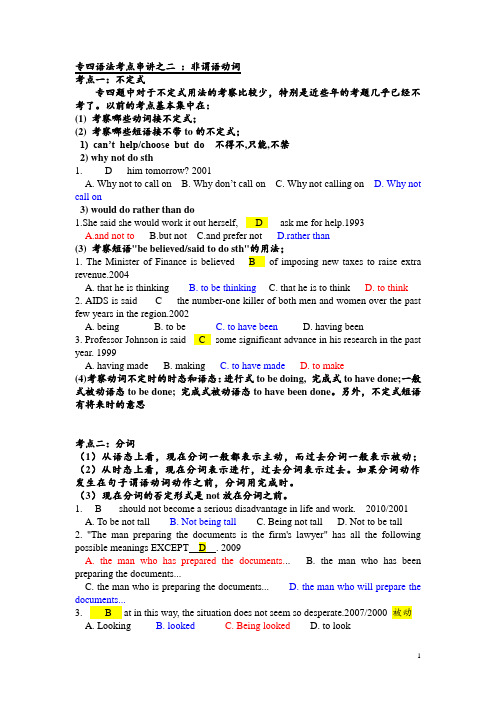
专四语法考点串讲之二:非谓语动词
考点一:不定式
专四题中对于不定式用法的考察比较少,特别是近些年的考题几乎已经不考了。以前的考点基本集中在:
(1) 考察哪些动词接不定式;
(2) 考察哪些短语接不带to的不定式;
1) can’t help/choose but do 不得不,只能,不禁
2) why not do sth
1. ____D___him tomorrow? 2001
A. Why not to call on
B. Why don’t call on
C. Why not calling on
D. Why not call on
3) would do rather than do
1.She said she would work it out herself, ___D_
A.and not to
B.but not
C.and prefer not
D.rather than
(3) 考察短语"be believed/said to do sth"的用法;
1. The Minister of Finance is believed __B__ of imposing new taxes to raise extra
A. that he is thinking
B. to be thinking
C. that he is to think
2. AIDS is said ___C___the number-one killer of both men and women over the past few years in the region.2002
2 专四语法(非谓语动词)
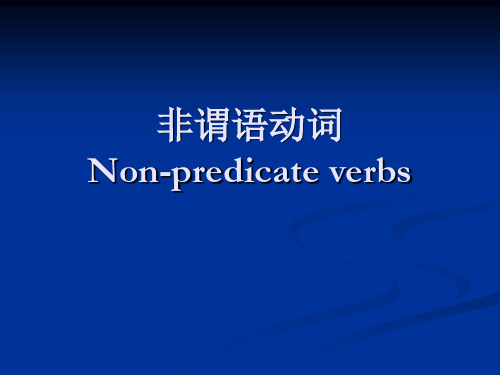
D. 有些动词后既能接不定式又能接动名词,如: regret, remember, forget, stop, etc. 此时,二者的差别 很大,需要加以区别。
eg. I never regretted _____ the offer, for it was not where my interest lay. (93, 53) A. not to accept B. not having accepted C. having not accepted D. not accepting [D] 解析:to regret doing sth. 表示“后悔做过某 事”;to regret to do sth. 表示“对做某事感 到遗憾”。
2、非谓语动词作宾语 (1)不定式和动名词可以在句中充当宾语,但分 词却不可以。 A. 有些动词后只能接动名词,如:abandon, acknowledge, advocate, anticipate, appreciate, avoid, admit, consider, delay, deny, enjoy, excuse, fancy, favor, finish, forgive, imagine, involve, mention, mind, pardon, practice, postpone, recall,recollect, risk, resist, suggest, tolerate。如: I appreciate having been given the opportunity to study abroad two years ago.
完整版专四英语语法考点分析解析
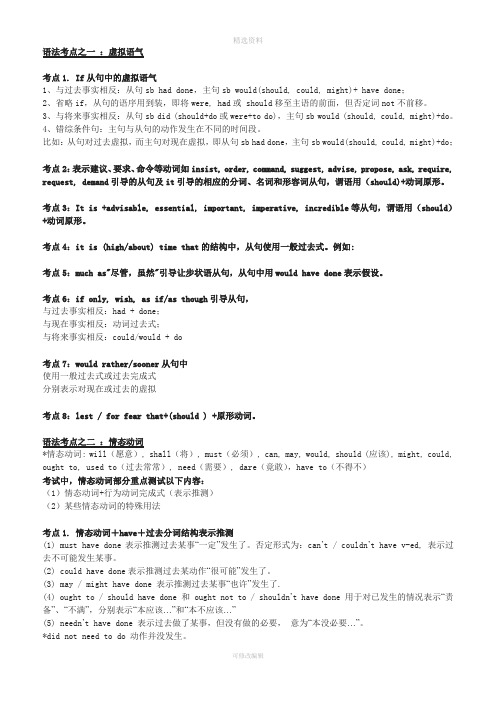
语法考点之一:虚拟语气
考点1. If从句中的虚拟语气
1、与过去事实相反:从句sb had done,主句sb would(should, could, might)+ have done;
2、省略if,从句的语序用到装,即将were, had或should移至主语的前面,但否定词not不前移。
3、与将来事实相反:从句sb did (should+do或were+to do),主句sb would (should, could, might)+do。
4、错综条件句:主句与从句的动作发生在不同的时间段。
比如:从句对过去虚拟,而主句对现在虚拟,即从句sb had done,主句sb would(should, could, might)+do;
考点2:表示建议、要求、命令等动词如insist, order, command, suggest, advise, propose, ask, require, request, demand引导的从句及it引导的相应的分词、名词和形容词从句,谓语用(should)+动词原形。
考点3:It is +advisable, essential, important, imperative, incredible等从句,谓语用(should)+动词原形。考点4:it is (high/about) time that的结构中,从句使用一般过去式。例如:
考点5:much as"尽管,虽然"引导让步状语从句,从句中用would have done表示假设。
英语语法---独立结构(详解)
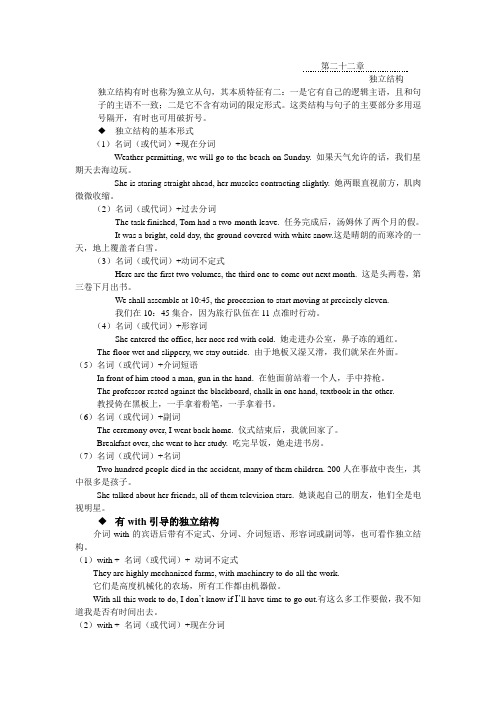
第二十二章
独立结构独立结构有时也称为独立从句,其本质特征有二:一是它有自己的逻辑主语,且和句子的主语不一致;二是它不含有动词的限定形式。这类结构与句子的主要部分多用逗号隔开,有时也可用破折号。
◆独立结构的基本形式
(1)名词(或代词)+现在分词
Weather permitting, we will go to the beach on Sunday. 如果天气允许的话,我们星期天去海边玩。
She is staring straight ahead, her muscles contracting slightly. 她两眼直视前方,肌肉微微收缩。
(2)名词(或代词)+过去分词
The task finished, Tom had a two-month leave. 任务完成后,汤姆休了两个月的假。
It was a bright, cold day, the ground covered with white snow.这是晴朗的而寒冷的一天,地上覆盖者白雪。
(3)名词(或代词)+动词不定式
Here are the first two volumes, the third one to come out next month. 这是头两卷,第三卷下月出书。
We shall assemble at 10:45, the procession to start moving at precisely eleven.
我们在10:45集合,因为旅行队伍在11点准时行动。
(4)名词(或代词)+形容词
- 1、下载文档前请自行甄别文档内容的完整性,平台不提供额外的编辑、内容补充、找答案等附加服务。
- 2、"仅部分预览"的文档,不可在线预览部分如存在完整性等问题,可反馈申请退款(可完整预览的文档不适用该条件!)。
- 3、如文档侵犯您的权益,请联系客服反馈,我们会尽快为您处理(人工客服工作时间:9:00-18:30)。
非谓语动词作状语的用法的比较是此类 语法考试的最重要的项目,非谓语动词 作宾语也是主要的考试内容。
1. 非谓语动词作主语
1. to do 和doing,可以作主语,含义不同, to do 强调结果(一般指具体或一次性的 动作),doing强调进程(一般或抽象的 多次动作),分词形式不能作主语。
I. 非谓语动词
非谓语动词也称为动词的非限定式,主要有不 定式,v+ing, v+ed三种形式 非谓语动词有双重性质,既有动词的特点, (有时态、语态的变化,能被状语修饰,也有 自己的宾语。)又有非动词的特点(替代名词 或形容词。) 非谓语动词的语法成份:在句中可作非谓语之 外的其他各种成份,如主语,表语,补语,宾 语,定语和状语。
3) +doing, +to do 都可以的动词,一般无区别 Attempt, begin, can’t bear, deserve, continue, dread, hate, intend, like, loathe, love, need, neglect, omit, plan, prefer, require, start等, (P246章) 如上述动词为进行体,后则接不定式。 I’m starting to work/ it’s beginning to rain. 上述动词中need/want/require/deserve doing 表示被动。
4) +doing, +to do 都可以的动词,意 思完全不同(P247章) Forget, go on, leave off, mean, regret, remember, stop Mean doing 意味着 Mean to do 打算… Regret to do/ doing
2)接doing的动词 Admit/acknowledge/ advise/ advocate/ allow/ anticipate/ appreciate/ avoid/ can’t help/ complete/ confess/ consider/ defer/ delay/ deny/ endure/ enjoy/ escape/ excuse/ fancy/ favor/ finish/ forbid/ grudge/ imagine/ include/ involve/ justify/ mention/ mind/ miss/ pardon/ postpone/ practise / prevent /quit/ recall/ report/ require/ resist/resume/ risk/ stand/ suggest/ understand等
2. 非谓语动词作宾语
Biblioteka Baidu
1.to do 和doing可作宾语,done不行 To do 表未完成或未发生,doing表已完成或已 发生。 1)接to do的动词:afford/agree/aim/apply arrange/ ask/ beg/ choose/ claim/ dare/ decide/ decline/ demand/ desire/ determine/ expect/ fail/ guarantee/ hope/ manage/ offer/ ought / plan/ prepare/ presume/ pretend/ proceed/ promise/ refuse/ request/ resolve/ seek/ strive/ swear/ threaten/ undertake/ volunteer/ wish 等
5)不定式同疑问词一起作宾语(v.+疑 问词+to do)时常用的动词包括: Consider/ decide/ know/ explain /forget/ learn/ remember/ tell/ wonder
真题演练(1993)
I never regretted_______ the offer, for it was not where my interest lay. A. not to accept B. not having accepted C. having not accepted D. not accepting D.我从不后悔没有接受那个提议,因为那并非 我的兴趣所以。B的表达包括了时间概念,而 该题并没有强调事件发生的先后顺序,没有时 态要求。
3.非谓语动词作补语的要点提示
1. 现在分词表动作正在进行, 过去分词表被动, 不定式表动作已完成或结束 2.补语如果是非持续性动词,不定式表 一次性的动作,现在分词则表示反复发 生的动作。
2. it is a./n. +doing no good/no use/such a pity/ a waste of time /not an easy task good/better/foolish/useful/useless/difficult/po ssible It is +a./n.+ to do easy/difficult /right/ wrong/ important / clever/ foolish/ polite/ impolite/ pity/ honor/ shame/ odd
3.如果主语和表语都是非谓语动词,两 者应保持同样的形式,或同为不定式, 或同为动名词。 A is to B what C is to D. 水对鱼就象空气对人一样重要。
Water is to fish what air is to man.
真题演练(2001)
———— is not a serious disadvantage in life. A. to be not tall B. not to be tall C. being not tall D. not being tall D. 在BD两项中选一项
